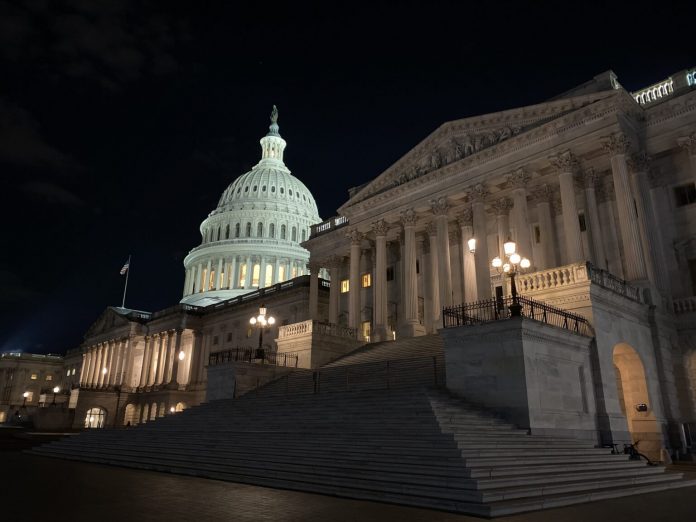WASHINGTON — Congress’ failure to pass a short-term government funding bill before midnight Tuesday will lead to the first shutdown in nearly seven years and give President Donald Trump broad authority to determine what federal operations keep running — which will have a huge impact on the government, its employees, states and Americans.
A funding lapse this year would have a considerably wider effect than the 35-day one that took place during Trump’s first term and could last longer, given heightened political tensions.
The last shutdown didn’t affect the departments of Defense, Education, Energy, Health and Human Services, Labor and Veterans Affairs, since Congress had approved those agencies’ full-year funding bills.
Lawmakers had also enacted the Legislative Branch appropriations bill, exempting Capitol Hill from any repercussions.
That isn’t the case this time around since none of the dozen government spending bills have become law. That means nearly every corner of the federal government will feel the pain in some way if a compromise isn’t reached by the start of the fiscal year on Oct. 1.
States Newsroom’s Washington, D.C. Bureau offers you a quick guide to what could happen if Republicans and Democrats don’t broker an agreement in time.
How does the White House budget office determine what government operations are essential during a shutdown?
Generally, federal programs that include the preservation of life or property as well as those addressing national security continue during a shutdown, while all other activities are supposed to cease until a funding bill becomes law.
But the president holds expansive power to determine what activities within the executive branch are essential and which aren’t, making the effects of a shutdown hard to pinpoint unless the Trump administration shares that information publicly.
Presidential administrations have traditionally posted contingency plans on the White House budget office’s website, detailing how each agency would shut down — explaining which employees are exempt and need to keep working, and which are furloughed.
That appears to have changed this year. The web page that would normally host dozens of contingency plans remained blank until late September, when the White House budget office posted that a 940-page document released in August calls for the plans to be “hosted solely on each agency’s website.”
Only a few departments had plans from this year posted on their websites as of Friday afternoon.
The White House budget office expects agencies to develop Reduction in Force plans as part of their shutdown preparation, signaling a prolonged funding lapse will include mass firings and layoffs.
While the two-page memo doesn’t detail which agencies would be most affected, it says layoffs will apply to programs, projects, or activities that are “not consistent with the President’s priorities.”
Trump will be paid during a shutdown since Article II, Section 1, Clause 7 of the Constitution prevents the president’s salary from being increased or decreased during the current term.
No one else in the executive branch — including Cabinet secretaries, more than 2 million civilian employees and over 1 million active duty military personnel — will receive their paycheck until after the shutdown ends.
Are federal courts exempt from a shutdown since they’re a separate branch of government?
The Supreme Court will continue to conduct normal operations in the event of a shutdown, according to its Public Information Office.
The office said the court “will rely on permanent funds not subject to annual approval, as it has in the past, to maintain operations through the duration of short-term lapses of annual appropriations,” in a statement shared with States Newsroom.
As for any impact on lower federal courts, the Administrative Office of the U.S. Courts said the federal judiciary was still assessing the fiscal 2026 outlook and had no comment.
The office serves as the central support arm of the federal judiciary.
During the last government shutdown from late 2018 into early 2019, federal courtsremained open using court fee balances and “no-year” funds, which are available for an indefinite period.
The Administrative Office of the U.S. Courts has said that if those funds run out, they would operate under the terms of the Anti-Deficiency Act, which “allows work to continue during a lapse in appropriations if it is necessary to support the exercise of Article III judicial powers.”
Supreme Court justices and appointed federal judges continue to get paid during a government shutdown, as Article III of the Constitution says the judges’ compensation “shall not be diminished” during their term.
What happens to Social Security, Medicare and Medicaid?
The three programs exist largely outside of the annual appropriations process, since lawmakers categorized them as “mandatory spending.”
This means Social Security checks as well as reimbursements to health care providers for Medicare and Medicaid services should continue as normal.
One possible hitch is the salaries for people who run those programs are covered by annual appropriations bills, so there could be some staffing problems for the Social Security Administration and the Centers for Medicare and Medicaid Services, depending on their contingency plans.
The first Trump administration’s shutdown guidance for the Social Security Administration showed 54,000 of 63,000 employees at that agency would have kept working. The CMS plan from 2020 shows that it intended to keep about 50% of its employees working in the event of a shutdown. Neither had a current plan as of Friday.
Will the Department of Veterans Affairs be able to keep providing health care and benefits?
Veterans can expect health care to continue uninterrupted at VA medical centers and outpatient clinics in the event of a shutdown. Vets would also continue to receive benefits, including compensation, pension, education and housing, according to the Department of Veterans Affairs contingency planning for a funding lapse that is currently published on the department’s website. It’s unclear if the plan will be the one the Trump administration puts into action.
But a shutdown would affect other VA services. For example, the GI Bill hotline would close, and all in-person and virtual career counseling and transition assistance services would be unavailable.
Additionally, all regional VA benefits offices would shutter until Congress agreed to fund the government. The closures would include the Manila Regional Office in the Philippines that serves veterans in the Pacific region.
All department public outreach to veterans would also cease.
Will Hubbard, spokesperson for Veterans Education Success, said his advocacy organization is bracing for increased phone calls and emails from veterans who would normally call the GI Bill hotline.
“Questions are going to come up, veterans are going to be looking for answers, and they’re not going to be able to call like they would be able to normally, that’s going to be a big problem,” Hubbard said.
“Most of the benefits that people are going to be most concerned about will not be affected, but the ones that do get affected, for the people that that hits, I mean, it’s going to matter a lot to them. It’s going to change the direction of their planning, and potentially the direction of their life,” Hubbard said.
The Department of Veterans Affairs and the Office of Management and Budget did not respond to a request for current VA shutdown guidance.
What happens to immigration enforcement and immigration courts?
As the Trump administration continues with its aggressive immigration tactics in cities with high immigrant populations, that enforcement is likely to continue during a government shutdown, according to the Department of Homeland Security’s March guidance for operating in a government shutdown.
Immigration-related fees will continue, such as for processing visas and applications from U.S. Citizenship and Immigration Services.
And DHS expects nearly all of its U.S. Immigration and Customs Enforcement employees to be exempt — 17,500 out of 20,500 — and continue working without pay amid a government shutdown.
That means that ICE officers will continue to arrest, detain and remove from the country immigrants without legal status. DHS is currently concentrating immigration enforcement efforts in Chicago, known as “Operation Midway Blitz.”
Other employees within DHS, such as those in Transportation Security Administration, will also be retained during a government shutdown. There are about 58,000 TSA employees that would be exempt and continue to work without pay in airports across the country.
DHS did not respond to States Newsroom’s request for a contingency plan if there is a government shutdown.
Separately, a shutdown would also burden the overwhelmed immigration court system that is housed within the Department of Justice. It would lead to canceling or rescheduling court cases, when there is already a backlog of 3.4 million cases.
The only exceptions are immigration courts that are located within Immigrations and Customs Enforcement, or ICE, detention centers, but most cases would need to be rescheduled. The partial government shutdown that began in December 2018 caused nearly 43,000 court cases to be canceled, according to a report by Syracuse University’s Transactional Records Access Clearinghouse, or TRAC.
And 28 states have an immigration court, requiring some immigrants to travel hundreds, or thousands, of miles for their appointment.
States that do not have an immigration court include Alabama, Alaska, Arkansas, Delaware, Idaho, Indiana, Iowa, Kansas, Kentucky, Maine, Mississippi, Montana, New Hampshire, North Dakota, Oklahoma, Rhode Island, South Carolina, South Dakota, Vermont, West Virginia, Wisconsin and Wyoming.
Will people be able to visit national parks or use public lands during a shutdown?
Probably, but that may be bad for parks’ long-term health.
During the 2018-2019 shutdown, the first Trump administration kept parks open, with skeleton staffs across the country struggling to maintain National Park Service facilities.
Theresa Pierno, the president and CEO of the advocacy group National Parks Conservation Association, said in a Sept. 23 statement the last shutdown devastated areas of some parks.
“Americans watched helplessly as Joshua Trees were cut down, park buildings were vandalized, prehistoric petroglyphs were defaced, trash overflowed leading to wildlife impacts, and human waste piled up,” she wrote. “Visitor safety and irreplaceable natural and cultural resources were put at serious risk. We cannot allow this to happen again.”
The National Park Service’s latest contingency plan was published in March 2024, during President Joe Biden’s administration. It calls for at least some closures during a shutdown, though the document says the response will differ from park to park.
Restricting access to parks is difficult due to their physical characteristics, the document said, adding that staffing would generally be maintained at a minimum to allow visitors. However, some areas that are regularly closed could be locked up for the duration of a shutdown.
But that contingency plan is likely to change before Tuesday, spokespeople for the Park Service and the Interior Department, which oversees NPS, said Sept. 25.
“The lapse in funding plans on our website are from 2024,” an email from the NPS office of public affairs said. “They are currently being reviewed and updated.”
Hunters and others seeking to use public lands maintained by Interior’s Bureau of Land Management and the U.S. Forest Service, which is overseen by the U.S. Department of Agriculture, will likely be able to continue to do so, though they may have to make alternative plans if they’d planned to use facilities such as campgrounds.
Land Tawney, the co-chair of the advocacy group American Hunters and Anglers, said campgrounds, toilets and facilities that require staffing would be inaccessible, but most public lands would remain available.
“Those lands are kind of open and they’re just unmanned, I would say, and that’s not really gonna change much,” he said. “If you’re staying in a campground, you’ve got to figure something else out.”
As with national parks, access to U.S. Fish and Wildlife Service refuges and other hunting and fishing sites will differ from site to site, Tawney said. The Fish and Wildlife Service doesn’t require permits for hunting on its lands, but access to some refuges is determined by a staff-run lottery drawing. If those drawings can’t be held, access to those sites will be limited, Tawney said.
What happens to the Internal Revenue Service?
How the Internal Revenue Service would operate during a government shutdown remains unclear.
When Congress teetered on letting funding run out in March, the nation’s revenue collection agency released a contingency plan to continue full operations during the height of tax filing season.
The IRS planned to use funds allocated in the 2022 budget reconciliation law to keep its roughly 95,000 employees processing returns and refunds, answering the phones, and pursuing audits.
Ultimately Congress agreed on a stopgap funding bill to avoid a March shutdown, but much has changed since then.
The new tax and spending law, signed by Trump on July 4 and often referred to as the “one big beautiful bill,” made major changes to the U.S. tax code.
Additionally, the agency, which processes roughly 180 million income tax returns per year, has lost about a quarter of its workforce since January. Top leadership has also turned oversix times in 2025.
Rachel Snyderman, of the Bipartisan Policy Center, said workforce reductions combined with a string of leadership changes could factor into how the agency would operate during a funding lapse.
“It’s really difficult to understand both what the status of the agency would be if the government were to shut down in less than a week, and also the impacts that a prolonged shutdown could have on taxpayer services and taxpayers at large,” said Snyderman, the think tank’s managing director of economic policy.
Do federal employees get back pay after a shutdown ends?
According to the Office of Personnel Management — the executive branch’s chief human resources agency — “after the lapse in appropriations has ended, employees who were furloughed as the result of the lapse will receive retroactive pay for those furlough periods.”
The Government Employee Fair Treatment Act of 2019 requires furloughed government employees to receive back pay as a result of a government shutdown.
That law does not apply to federal contractors, who face uncertainty in getting paid during a shutdown.
What role does Congress have during a shutdown?
The House and Senate must approve a stopgap spending bill or all dozen full-year appropriations bills to end a shutdown, a feat that requires the support of at least some Democrats to get past the upper chamber’s 60-vote legislative filibuster.
Speaker Mike Johnson, R-La., and Senate Majority Leader John Thune, R-S.D., control their respective chambers’ calendars as well as the floor schedule, so they could keep holding votes on the stopgap bill Democrats have already rejected or try to pass individual bills to alleviate the impacts on certain agencies.
Neither Johnson nor Thune has yet to suggest bipartisan negotiations with Democratic leaders about funding the government. And while they are open to discussions about extending the enhanced tax credits for people who buy their health insurance from the Affordable Care Act Marketplace, they don’t want that decision connected to the funding debate.
Democratic leaders have said repeatedly that Republicans shouldn’t expect them to vote for legislation they had no say in drafting, especially with a health care cliff for millions of Americans coming at the end of the year.
Members of Congress will receive their paychecks regardless of how long a shutdown lasts, but the people who work for them would only receive their salaries after it ends.
Lawmakers must be paid under language in Article I, Section 6, Clause 1 of the Constitution as well as the 27th Amendment, which bars members of Congress from changing their salaries during the current session.
Lawmakers have discretion to decide which of their staff members continue working during a shutdown and which are furloughed.
A spokesperson for the U.S. Capitol Police, which is tasked with protecting members amid a sharp rise in political violence, said a shutdown “would not affect the security of the Capitol Complex.”
“Our officers, and the professional staff who perform or support emergency functions, would still report to work,” the spokesperson said. “Employees who are not required for emergency functions would be furloughed until funding is available.”











